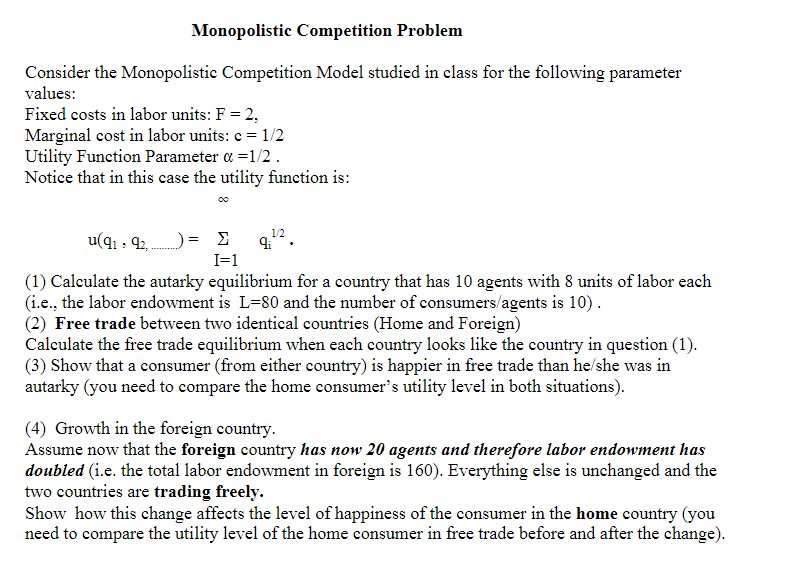Monopolistic Competition Problem Consider the Monopolistic Competition Model studied in class for the following parameter values: Fixed costs in labor units: F = 2, Marginal cost in labor units: c = 1/2 Utility Function Parameter a =1/2. Notice that in this case the utility function is: u(q1 ; 92, .) = E I=1 1/2 (1) Calculate the autarky equilibrium for a country that has 10 agents with 8 units of labor each (i.e., the labor endowment is L=80 and the number of consumers/agents is 10). (2) Free trade between two identical countries (Home and Foreign) Calculate the free trade equilibrium when each country looks like the country in question (1).
Monopolistic Competition Problem Consider the Monopolistic Competition Model studied in class for the following parameter values: Fixed costs in labor units: F = 2, Marginal cost in labor units: c = 1/2 Utility Function Parameter a =1/2. Notice that in this case the utility function is: u(q1 ; 92, .) = E I=1 1/2 (1) Calculate the autarky equilibrium for a country that has 10 agents with 8 units of labor each (i.e., the labor endowment is L=80 and the number of consumers/agents is 10). (2) Free trade between two identical countries (Home and Foreign) Calculate the free trade equilibrium when each country looks like the country in question (1).
Managerial Economics: Applications, Strategies and Tactics (MindTap Course List)
14th Edition
ISBN:9781305506381
Author:James R. McGuigan, R. Charles Moyer, Frederick H.deB. Harris
Publisher:James R. McGuigan, R. Charles Moyer, Frederick H.deB. Harris
Chapter12: Price And Output Determination: Oligopoly
Section: Chapter Questions
Problem 1E
Related questions
Question
Only for question#2

Transcribed Image Text:Monopolistic Competition Problem
Consider the Monopolistic Competition Model studied in class for the following parameter
values:
Fixed costs in labor units: F = 2,
Marginal cost in labor units: c = 1/2
Utility Function Parameter a =1/2 .
Notice that in this case the utility function is:
00
1/2
u(q1 , 42,
Σ
I=1
(1) Calculate the autarky equilibrium for a country that has 10 agents with 8 units of labor each
(i.e., the labor endowment is L=80 and the number of consumers/agents is 10).
(2) Free trade between two identical countries (Home and Foreign)
Calculate the free trade equilibrium when each country looks like the country in question (1).
(3) Show that a consumer (from either ecountry) is happier in free trade than he/she was in
autarky (you need to compare the home consumer's utility level in both situations).
(4) Growth in the foreign country.
Assume now that the foreign country has now 20 agents and therefore labor endowment has
doubled (i.e. the total labor endowment in foreign is 160). Everything else is unchanged and the
two countries are trading freely.
Show how this change affects the level of happiness of the consumer in the home country (you
need to compare the utility level of the home consumer in free trade before and after the change).
Expert Solution
This question has been solved!
Explore an expertly crafted, step-by-step solution for a thorough understanding of key concepts.
This is a popular solution!
Trending now
This is a popular solution!
Step by step
Solved in 2 steps with 1 images

Knowledge Booster
Learn more about
Need a deep-dive on the concept behind this application? Look no further. Learn more about this topic, economics and related others by exploring similar questions and additional content below.Recommended textbooks for you

Managerial Economics: Applications, Strategies an…
Economics
ISBN:
9781305506381
Author:
James R. McGuigan, R. Charles Moyer, Frederick H.deB. Harris
Publisher:
Cengage Learning


Managerial Economics: Applications, Strategies an…
Economics
ISBN:
9781305506381
Author:
James R. McGuigan, R. Charles Moyer, Frederick H.deB. Harris
Publisher:
Cengage Learning
